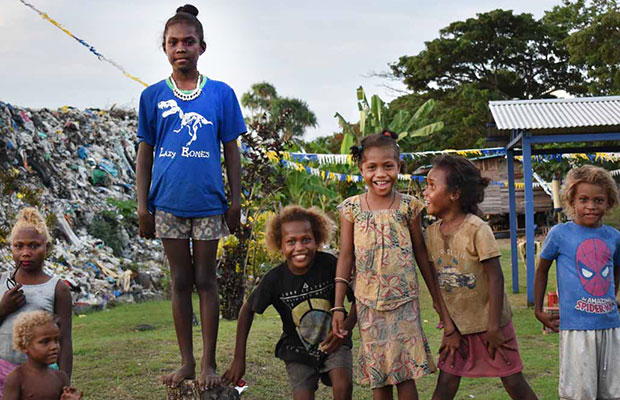
Bringing the Joy of Learning to Impoverished Children
In the poverty-stricken community of Ranadi, a suburb of Honiara in the Solomon Islands, overcoming economic adversity is an uphill battle for families—one often fought, and lost, in the trash heaps of the local landfills. For survival, destitute parents are often forced to make harrowing decisions to keep their children out of school in order to dig through garbage in search of recyclables to peddle.
“When families are so poor that they can’t even meet their most basic needs—and constantly worry where their next meal will come from—sending their sons and daughters to school simply isn’t an option,” explains Father Gus Baek, director of Salesian Missions.
In many ways, it’s hard to argue with this reasoning. Unfortunately, fewer than 35 percent of adults living in poverty in the Solomon Islands are literate, which contributes to generational poverty.
Since 1995, our Salesian missionaries have been working to help improve living conditions, offer access to education, and provide employment opportunities for people throughout the country. In more recent years, they have intensified their efforts in Ranadi, with the goal of reversing the course of poverty and poor health for its families—starting with education.
Recently, the Don Bosco Technical Institute Henderson launched a one-year literacy program that enrolls children, ages 4-13, whose families are unable to afford a government school. “Although the education might be free,” says Fr. Gus, “the associated fees in these government assisted schools—for food, uniforms and supplies—are insurmountable.”
Educators who run the Don Bosco Technical Institute Henderson follow a strict enrollment process designed to ensure that children make the most of the opportunity. As the staff explains, “We do a survey of the locality to identify the children who work in the garbage dumps and do not attend any school at all. We contact the parents and leaders of the landfill site.”
Once enrolled, children attend intensive classes in English and math organized by students’ learning abilities. Teachers regularly evaluate their progress and assign them to higher or lower levels depending on their understanding of the material. Above all else, classes follow a “joyful learning” model—meaning that in addition to textbooks, lessons also include games, songs and other activities that engage children’s curiosity and attention. And, to encourage attendance, students are picked up in the school van in the morning and dropped off to their families in the afternoon.
Ultimately, the goal is to enroll these students in mainstream school so they can continue their education after successfully completing the literacy program.
Our mission brings educational opportunities to the world’s most impoverished children, so they can begin to build brighter futures. What’s your mission?
Learn more about our work in the Solomon Islands.

